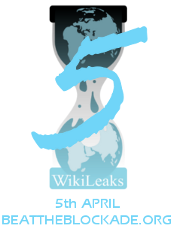2012-03-24 On financial blockades as a political tool for censorship
In an interview published this week in Law.Com, general counsel for the Washington DC based nonprofit Center for Democracy & Technology, David Sohn, discusses the protests against SOPA and PIPA, including the January 18 internet blackout action. In general, he disparages the methods proposed in the bills for shutting down sites that are alleged to be copyright infringers, claiming concern over the likelihood that ISPs put into policing roles will take a more risk averse approach in shutting down sites, resulting in a curtailment of freedom of expression. However when he is asked how he would balance the right to free speech on the Internet with the need to curtail online IP theft, his response is:
The portions of the bills that worked were those that took a follow-the-money approach by cutting off the funding support for rogue websites. WikiLeaks provides an instructive example. All of the efforts to make it disappear didn't work, but what did work was the financial blockade that made it impossible for WikiLeaks to fund the bandwidth it needed to run.
Putting aside his misguided claim that WikiLeaks actually ceased operating after the financial blockade was imposed on them in December 2010, his comments do in other ways properly reflect the grim reality. What Sohn is referring to here are the provisions in SOPA / PIPA that prohibit any site accused of piracy from doing business with other services, such as PayPal or any advertising platform. Almost precisely what was done to WikiLeaks having their relationships cut off not only with PayPal, but also with Visa, MasterCard, Bank of America and Western Union - resulting in the loss of 95% of their income from donations - their only income - for the last 15 months.
Almost the same thing, but not quite. The difference being that these penalties, had SOPA / PIPA not been halted (for now) by a massive global internet campaign in January, would have been applied under law. Under Section 102 of SOPA, the Attorney General would be empowered to order American companies from doing business with any alleged infringing web site. In the case of the withdrawal of services for WikiLeaks, no such lawful basis can be found. Vague references to 'Terms of service' are about as much explanation as anyone has been given.
In a panel discussion in January 2011 co-founder of PayPal Peter Thiel acknowledges that they and other companies are essentially acting under pressure from the government in the WikiLeaks and other cases - where perhaps, in his words, a more 'heroic CEO' would make the right moral choice, most will succumb to the 'incredible pressure to cave'. Further describing justifications by companies of the action against WikiLeaks, he goes on:
You've got various forms of corporate boilerplate ..when you peel it back maybe it doesn't mean quite as much
- Peter Thiel, speaking at the Churchill Club, January 2011, on the question 'Did WikiLeaks stand a a chance?': http://www.youtube.com/watch?v=IFsof6bulto
Of course the blockade has been orchestrated by an enraged and embarrassed US Government, coming as it did immediately after the release of the CableGate archive. This is patently obvious to even the most credulous of observers. It has been politically motivated, and carried out without due process. And yet, concerningly for what we believe to be democratic societies in which we follow the rule of law, these companies' actions have been allowed to stand. Recently Australian Greens Senator Scott Ludlam called on anyone who used one of these services to go to the company with a complaint:
I’m using your services, I was pretty happy with them, but you have removed my freedom to deal with a legitimate organisation that hasn’t been convicted of a crime in any country. What on earth are you doing? Is that even legal? Should I write to the competition regulator? Or will you just lift the blockade and be reasonable?
- Senator Scott Ludlam, speaking at the WikiLeaks, Assange and Democracy Forum, February 17 2012, Sydney: http://vimeo.com/39031932
In addition to writing to, phoning and lobbying these companies and our financial regulators, there is something else that any of us can do to object to the financial blockade of WikiLeaks: use one of the remaining available methods to support them and donate. Recently a campaign was launched to "donate five bucks to WikiLeaks on April 5". By taking action together and on a single day, a strong message will be sent that extrajudicial censorship of a publishing organisation that delivers us the truth will not be tolerated. By speaking with a united voice the internet stopped SOPA/PIPA in their tracks. It's time to do the same for the corporates who are telling us how we can and can't spend our money, and who won't own up as to why.
Visit the website http://beattheblockade.org or follow @beattheblockade to learn more.
